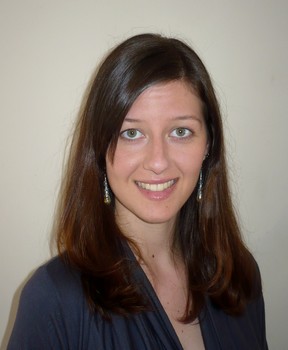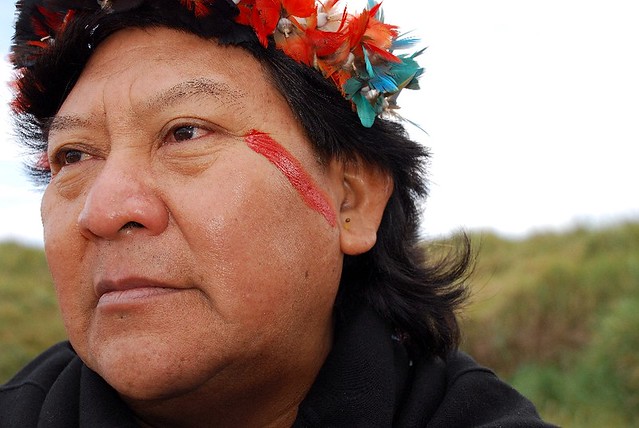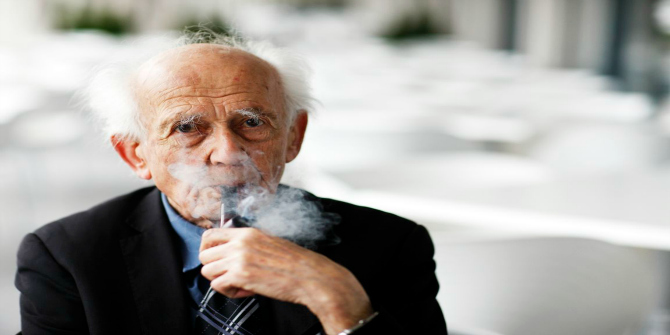 This book is a first-person account of the life story and cosmo-ecological thought of Davi Kopenawa, shaman and spokesman for the Yanomami of the Brazilian Amazon. Justine Seran finds The Falling Sky to be an important testimony on behalf of the Indigenous people of the Amazonian forest, and hopes it will have an impact on both local and international policy.
This book is a first-person account of the life story and cosmo-ecological thought of Davi Kopenawa, shaman and spokesman for the Yanomami of the Brazilian Amazon. Justine Seran finds The Falling Sky to be an important testimony on behalf of the Indigenous people of the Amazonian forest, and hopes it will have an impact on both local and international policy.
 The Falling Sky: Words of a Yanomami Shaman. Davi Kopenawa and Bruce Albert. Harvard University Press. November 2013.
The Falling Sky: Words of a Yanomami Shaman. Davi Kopenawa and Bruce Albert. Harvard University Press. November 2013.
Davi Kopenawa is a member of the Yanomami people of North Brazil, an initiated shaman and a land rights activist. First published as La chute du ciel in 2010, The Falling Sky is the fruit of his collaboration with French anthropologist Bruce Albert, who describes the book as “a life story, autoethnography, and cosmoecological manifesto” aiming at spreading Kopenawa’s story and educating Westerners about environmental issues (p.1). The first-person narration, uncommon in academic works, allows the reader to follow its narrator along a winding path blending personal recollections with the collective experience of the people, explanations of traditional knowledge, and Kopenawa’s personal elaboration on these traditions. Albert calls the hybrid structure of the book, with material arranged both chronologically and thematically, “an attempt to blend pure narrative parts with more ethnographic ones” (p.454).The Yanomami are a distinct cultural and linguistic group from the Amazon forest. With very little contact with white society, they have been able to retain their language and most of their habitat and customs, as opposed to First Nation Canadians, Australian Aboriginals, or Maori people, who were forcefully assimilated into settler society. Kopenawa himself is an internationally recognised advocate for climate consciousness who succeeded in getting official recognition for Yanomami land, or Terra Indígena Yanomami, in 1992. Among his many trips overseas, Kopenawa also spoke in front of the UK Parliament in June 2009.
The heart of The Falling Sky, entitled “Part II – Metal Smoke,” focuses on Kopenawa’s journey towards activism. After discussing Yanomami cosmogony through the story of the demiurge Omama, creator of all people and first owner of metal, Kopenawa mentions ancestral customs and takes the opportunity to condemn the introduction by white people of fatal epidemics and what he sees as the dangers of consumerism and materialism. The core of his activism is clearly to ensure the survival of his people and their way of life: “I want my children, their children, and the children of their children to be able to live in it [the forest] quietly. This is my entire thought and work” (p.259).
One of the important encounters shaping Kopenawa’s activism was with Christian missionaries who learnt the local language only to summon the Yanomami to abandon their beliefs and culture for God, or Deus in Portuguese. Since many of their own died when the missionaries survived the epidemics, the Yanomami ended up submitting to “the people of Teosi” (p.188). Kopenawa’s resentment towards missionaries who harassed his people with accusations of sin and threats of hell is pervasive, especially when the missionaries show flagrant disregard for local customs by forbidding shamans to heal people, and secretly burying the dead to prevent the Yanomami from mourning them according to tradition. Their presence is put to an end when a missionary, who repeats that they should not covet other men’s wives, impregnates one of their women: they realise that he is a hypocrite, conclude that his religion is a lie, and turn away from Christianity.

Kopenawa tells the story of his journey back to shamanism and traditional spiritual customs. As a teenager, he learns the white people’s language and works for FUNAI, or Fundação Nacional do Índio, a Brazilian government foundation under the military dictatorship at the time. As an interpreter between members of isolated tribes and officials in Manaus, Kopenawa becomes aware of white people’s plans to divide the Amazonian forest, and learns of the bombings and shootings they resort to when Indigenous people such as the Waimiri-Atroari refuse them entry to their land. Through the work of the CCPY, or Comissão Pró-Yanomami, a non-govermental charity aiming at preserving areas of the forest for the Yanomami people, Kopenawa realises that he has to fight for land rights.
The arrival of gold prospectors on Yanomami land is concomitant with the awakening of his activist consciousness: “These new words about protecting the forest came to me gradually, […] until they formed a long path in my mind” (p.262). Despite Indigenous resistance, prospectors keep coming in increasing numbers, wrecking havoc on the local wildlife and rivers. The numerous deaths of elders succumbing to epidemics or murdered by prospectors and the military mean that soon there is no-one left to pass on their wisdom, values, and traditions to the young who, to Kopenawa’s dismay, stop hunting and working the gardens to beg food and goods from white people. This loss of transmission also translates for the Yanomami in the impossibility to defend themselves and carry on living like their ancestors.
Although The Falling Sky is a first-person narrative, Kopenawa’s words are actually “recorded in his language, transcribed, translated, and then arranged and edited” by Albert, which raises the issue of white ethnographers speaking for the communities they take as objects of research. Indeed Albert constructs the text based on recording sessions led from 1989 to the early 2000s and describes himself as an “engaged observer,” neither ghost writer nor secretary, committed to avoiding intrusions into Kopenawa’s narrative yet acting as an intermediary (p.6).
In his conclusion, Albert gives a valuable and honest insight into the writing process of the book, talking about “the ethnographic pact” between him and the Yanomami people, and the mutual obligations it entails (p.430). As a scholar researching Indigenous writings, and thus keenly aware of the bad reputation of ethnographers (and academics in general) in these communities, I was particularly interested in Albert’s detailed defence of his editing process, including his awareness of the dangers of exoticism: “[t]his experience allowed me to propose a translation that falls midway between a literal translation, which risked becoming a caricature, and a literary transposition that would have been much too far from Yanomami language constructions” (p.452). The Falling Sky is first of all an important testimony on behalf of the Indigenous people of the Amazonian forest, and it is to be hoped this latest translation in English will open a readership in North America and have an impact on both local and international policy.
—————————
Justine Seran is studying for a PhD with the English Literature department at the University of Edinburgh. Her research falls within the broad remit of Postcolonial Studies with a focus on Aboriginal Australian and Aotearoa/New Zealand Maori literatures. Her doctoral thesis examines the dynamics of intersubjectivity and relationality in a large contemporary corpus of women’s writing. Justine’s wider interests include education, the social impact of research in the humanities, and literary processes of Indigenous cultural survivance in settler colonial nations. Read more reviews by Justine.








2 Comments